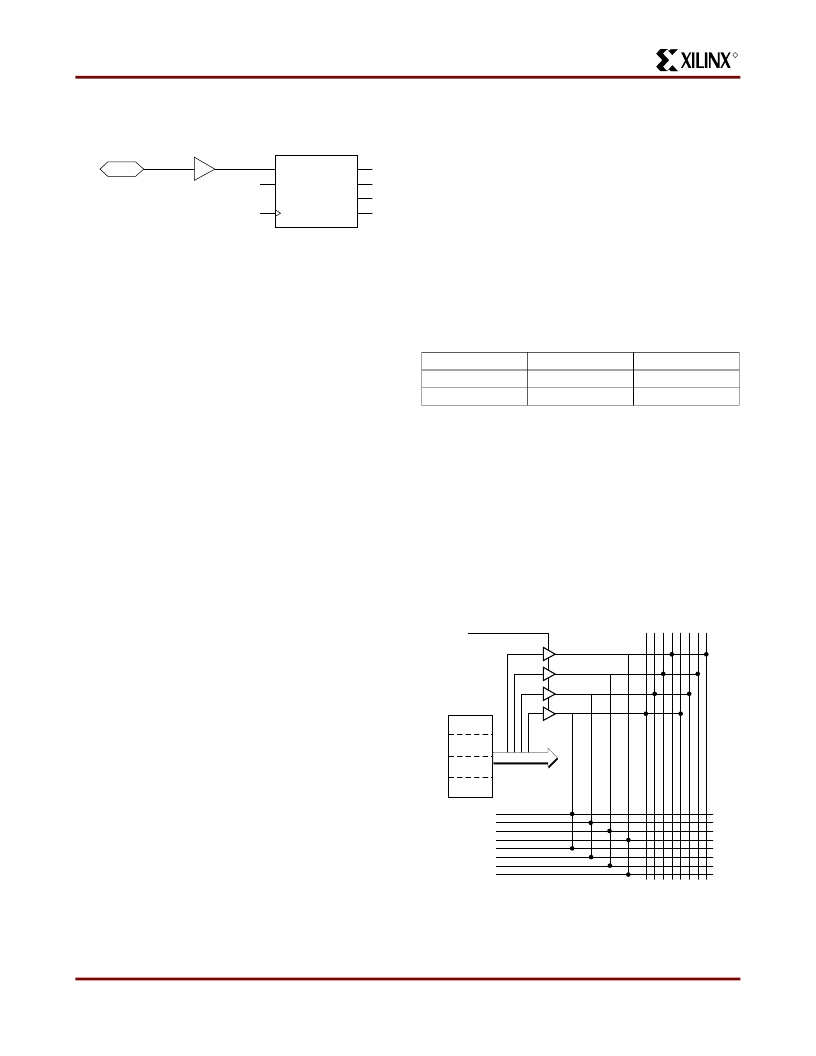- 您現(xiàn)在的位置:買賣IC網(wǎng) > PDF目錄371341 > XC5215-4HQ240I Field Programmable Gate Array (FPGA) PDF資料下載
參數(shù)資料
| 型號: | XC5215-4HQ240I |
| 英文描述: | Field Programmable Gate Array (FPGA) |
| 中文描述: | 現(xiàn)場可編程門陣列(FPGA) |
| 文件頁數(shù): | 8/73頁 |
| 文件大小: | 598K |
| 代理商: | XC5215-4HQ240I |
第1頁第2頁第3頁第4頁第5頁第6頁第7頁當(dāng)前第8頁第9頁第10頁第11頁第12頁第13頁第14頁第15頁第16頁第17頁第18頁第19頁第20頁第21頁第22頁第23頁第24頁第25頁第26頁第27頁第28頁第29頁第30頁第31頁第32頁第33頁第34頁第35頁第36頁第37頁第38頁第39頁第40頁第41頁第42頁第43頁第44頁第45頁第46頁第47頁第48頁第49頁第50頁第51頁第52頁第53頁第54頁第55頁第56頁第57頁第58頁第59頁第60頁第61頁第62頁第63頁第64頁第65頁第66頁第67頁第68頁第69頁第70頁第71頁第72頁第73頁

R
XC5200 Series Field Programmable Gate Arrays
7-90
November 5, 1998 (Version 5.2)
can also be independently disabled for any flip-flop. CLR is
active High. It is not invertible within the CLB.
Global Reset
A separate Global Reset line clears each storage element
during power-up, reconfiguration, or when a dedicated
Reset net is driven active. This global net (GR) does not
compete with other routing resources; it uses a dedicated
distribution network.
GR can be driven from any user-programmable pin as a
global reset input. To use this global net, place an input pad
and input buffer in the schematic or HDL code, driving the
GR pin of the STARTUP symbol. (See
Figure 9
.) A specific
pin location can be assigned to this input using a LOC
attribute or property, just as with any other user-program-
mable pad. An inverter can optionally be inserted after the
input buffer to invert the sense of the Global Reset signal.
Alternatively, GR can be driven from any internal node.
Using FPGA Flip-Flops and Latches
The abundance of flip-flops in the XC5200 Series invites
pipelined designs. This is a powerful way of increasing per-
formance by breaking the function into smaller subfunc-
tions and executing them in parallel, passing on the results
through pipeline flip-flops. This method should be seriously
considered wherever throughput is more important than
latency.
To include a CLB flip-flop, place the appropriate library
symbol. For example, FDCE is a D-type flip-flop with clock
enable and asynchronous clear. The corresponding latch
symbol is called LDCE.
In XC5200-Series devices, the flip-flops can be used as
registers or shift registers without blocking the function
generators from performing a different, perhaps unrelated
task. This ability increases the functional capacity of the
devices.
The CLB setup time is specified between the function gen-
erator inputs and the clock input CK. Therefore, the speci-
fied CLB flip-flop setup time includes the delay through the
function generator.
Three-State Buffers
The XC5200 family has four dedicated Three-State Buffers
(TBUFs, or BUFTs in the schematic library) per CLB (see
Figure 9
). The four buffers are individually configurable
through four configuration bits to operate as simple
non-inverting buffers or in 3-state mode. When in 3-state
mode the CLB output enable (TS) control signal drives the
enable to all four buffers. Each TBUF can drive up to two
horizontal and/or two vertical Longlines. These 3-state buff-
ers can be used to implement multiplexed or bidirectional
buses on the horizontal or vertical longlines, saving logic
resources.
The 3-state buffer enable is an active-High 3-state (i.e. an
active-Low enable), as shown in
Table 4
.
Another 3-state buffer with similar access is located near
each I/O block along the right and left edges of the array.
The longlines driven by the 3-state buffers have a weak
keeper at each end. This circuit prevents undefined float-
ing levels. However, it is overridden by any driver. To
ensure the longline goes high when no buffers are on, add
an additional BUFT to drive the output High during all of the
previously undefined states.
Figure 10
shows how to use the 3-state buffers to imple-
ment a multiplexer. The selection is accomplished by the
buffer 3-state signal.
PAD
IBUF
GR
GTS
CLK DONEIN
Q1Q4
Q2
Q3
STARTUP
X9009
Figure 8: Schematic Symbols for Global Reset
Table 4: Three-State Buffer Functionality
IN
X
IN
T
1
0
OUT
Z
IN
CLB
TS
LC3
LC2
LC1
LC0
CLB
Horizontal
Longlines
X9030
Figure 9: XC5200 3-State Buffers
相關(guān)PDF資料 |
PDF描述 |
|---|---|
| XC5215-4PG299I | Field Programmable Gate Array (FPGA) |
| XC5215-4PQ160I | Field Programmable Gate Array (FPGA) |
| XC5215-5PG299I | Field Programmable Gate Array (FPGA) |
| XC5215-5PQ160I | Field Programmable Gate Array (FPGA) |
| XC5204 | Field Programmable Gate Arrays(現(xiàn)場可編程門陣列) |
相關(guān)代理商/技術(shù)參數(shù) |
參數(shù)描述 |
|---|---|
| XC5215-4HQ304I | 制造商:未知廠家 制造商全稱:未知廠家 功能描述:Field Programmable Gate Array (FPGA) |
| XC5215-4PC84C | 制造商:XILINX 制造商全稱:XILINX 功能描述:Field Programmable Gate Arrays |
| XC5215-4PG156C | 制造商:XILINX 制造商全稱:XILINX 功能描述:Field Programmable Gate Arrays |
| XC5215-4PG191C | 制造商:XILINX 制造商全稱:XILINX 功能描述:Field Programmable Gate Arrays |
| XC5215-4PG223C | 制造商:XILINX 制造商全稱:XILINX 功能描述:Field Programmable Gate Arrays |
發(fā)布緊急采購,3分鐘左右您將得到回復(fù)。